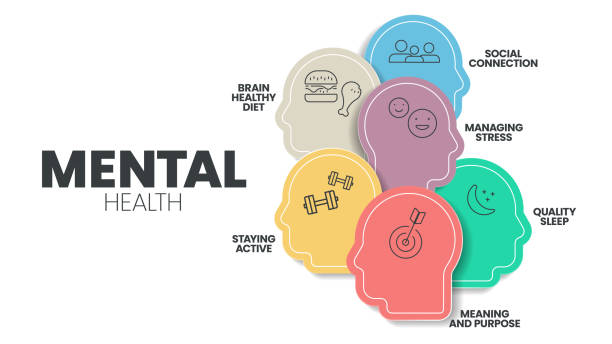5 Easy Ways to Improve Your Mental Health
We are often too quick to overlook how mentally healthy we are, and only when distress appears do we notice how it matters. Emotional changes are an inherent part of life, depending on work pressure, personal issues, or interaction with day-to-day stresses. Mental care may not be the most emotionally comfortable topic for people in crisis. There are numerous simple and useful techniques that users can easily implement in their lives. This little guide aims to help learning styles to become aware of strategies targeted to daily well-being.

1. Sleeping well is amongst the first priorities, which will donate to restoring the constancy of the mind.
Good mental health often starts off with valuing the quality of your sleep. Although there are many methods to stimulate a balance in the mind, ensuring that you acquire enough rest is anpect that is neglected yet vital. Lack of sleep makes it difficult for your brain to manage feelings and make reasoned choices. Studies constantly reveal that adults require 7 to 9 hours of continuous rest per night to operate effectively. Having a routine of going to bed and waking up at the same time every night keeps a healthy circadian rhythm in check.
The crucial thing for sleeping soundly is to clear screens from your bedroom for at least an hour before getting to bed and to prepare your bedroom for a cool, dark, and serene sleep. A sound night’s sleep may leave you in a great mood and help you feel overall good in the long run. It’s one of the activities that offer both immediate and long-term gains.
2. Engage in Physical Activity Daily
The point of exercise is not to get fit but to boost your mood. It is an easy and efficient approach to 5 Easy Ways to Improve Your Mental Health. Research has always proven that physical activity provokes the release of endorphins, which are neurotransmitters that may be quite influential in mood. At home, you can attempt to take a short, brisk walk, do yoga, or dance to help reduce stress, improve quality of sleep, and elevate self-esteem. You don’t need to train for a marathon; all that matters is that you follow through.
Regular participation in soft physical activities can bring drastic changes in mental well-being. Traditionally, therapists concerned with well-being are known to advise movement as a principal asset to enhance mental health for those with mild depressive symptoms or constant stress. Infusing physical activity into your regular schedule is more than just a physical thing; it is an empowering act of self-compassion.
3. Practice Mindfulness and Meditation
Modern life keeps us constantly distracted because it is constantly moving forward. A good argument is to introduce mindfulness and meditation to your daily routine. Such practices enable you to get your mind entirely into the present experience, thus reducing stress arising from possible regrets of the past or anxieties of what may lie in waiting. Getting a few mindful breaths in, using a meditation app, or even just drinking coffee mindfully can let you get tuned into what you’re thinking.
Clinical psychologists and neurologists advise that adopting just a small daily 10-minute mindfulness routine can be of help with reducing the symptoms of anxiety and depression. Through the practices, you can improve your focus, exercise more patience, and even change the brain structures that handle emotions. You don’t have to invest much time in spirituality or become an expert in order to enjoy its benefits. Do small steps, regularly practice, and see how your mindfulness will develop in its own way. Mindfulness practices are a bridge of thought between modern science and ancient wisdom.
4. Cultivate Meaningful Relationships
The deep-rooted sociability of people points to a major impact of relationships with other people on our mental health. Strong, supportive relationships are critical, as are the positive effects listed above. Having greater stress and experiencing increased bouts of depression are associated with increased feelings of loneliness and isolation. Conversely, the time devoted to cheering up the moods of friends or loved ones can increase your sense of belonging and self-worth. Spend some time in the presence of people who make you happy.
Forget about bottling something up and find it ok to ask for a hand when it’s required. If your current relationships are challenging or some sort of tension exists, it will be a good idea to search for support from communities, service work, or internet groups of people with similar interests. The quality and meaning of your ties often come into play in a greater way than the number of acquaintances you gather up. It is usually a valuable defense against tough times and brings lots of joy to form powerful connections with people.
5. Reduce your screen time and encourage engagements to meet.
Technology is a double-edged sword. On the one hand, tech enables communication and information but can propel stress, self-doubt, and burnout. Unexpected but mighty 5 Easy Ways to Improve Your Mental Health is taking a moment to deliberately unplug yourself from digital appliances. In constant contact with the social platforms, observing real-time news, and background Wi-Fi chatter, you can wear down your peace of mind and patterns of thoughts. Self-discipline in the form of limits (for instance, refraining from using phones at meals or having unobstructed periods offline on weekends) can bring back order to your schedule.
To decrease screen time, try to take pleasure in doing out-of-computer activities such as reading, journaling, going out in nature, or simply spending time doing what you are passionate about. Being part of this outside the internet allows you to ground and re-center your energy, demonstrating that true happiness is from beyond the internet world. Digital wellness experts consistently advise their patients to embrace “digital hygiene” as a trivial but surefire way of protecting their mental health. Consciously withdrawing from digital devices enables you to discover new levels of yourself and so is a highly powerful exercise for your mental health.
Conclusion: 5 Easy Ways to Improve Your Mental Health
Improving your mental health can begin with small, doable steps. Positive self-improvement depends solely on making purposeful and progressive decisions that would positively impact your well-being with each step. When you actively choose good sleep, a consistent exercise schedule, mindfulness, connection building, and screen time reduction, you are working towards self-care. The process merely requires that you continually and compassionately work toward such changes and so removes the necessity of being perfect or making drastic sacrifices. You do not have to handle your struggles on your own, and, focusing on your mental well-being, you begin to move towards happiness. Remember that it is a gradual process to improve mental well-being, and the changes you introduce will accumulate with time. As you go on a course toward improved mental health or stay on a wellness road, these 5 Easy Ways to Improve Your Mental Health help you daily.

FAQs about 5 Easy Ways to Improve Your Mental Health
Can I improve my mental well-being without having to go to a professional?
The following are vocabulary words: Definition: Nouns are rarely used alone in sentences. They help convey the meaning of adjectives and other words. The common examples of nouns are people, places, and things that represent actions or places. In case your symptoms persist or get worse in the process, professional advice is necessarily recommended.
The amount of time it might take to start to see changes may vary according to how far you are and the technique that you use; some methods may show results in just a few days, while others may take weeks or months how?
For example, you may feel better sleep or mood even after a few days of regular exercise. For instance, practicing mindfulness and the process of learning to respond to emotions might demonstrate some progress in a period of several weeks; also, the process of strengthening relationships might start to produce results at the same pace. Consistency is the whole thing: if you stay the course, you will reap the rewards in time.


